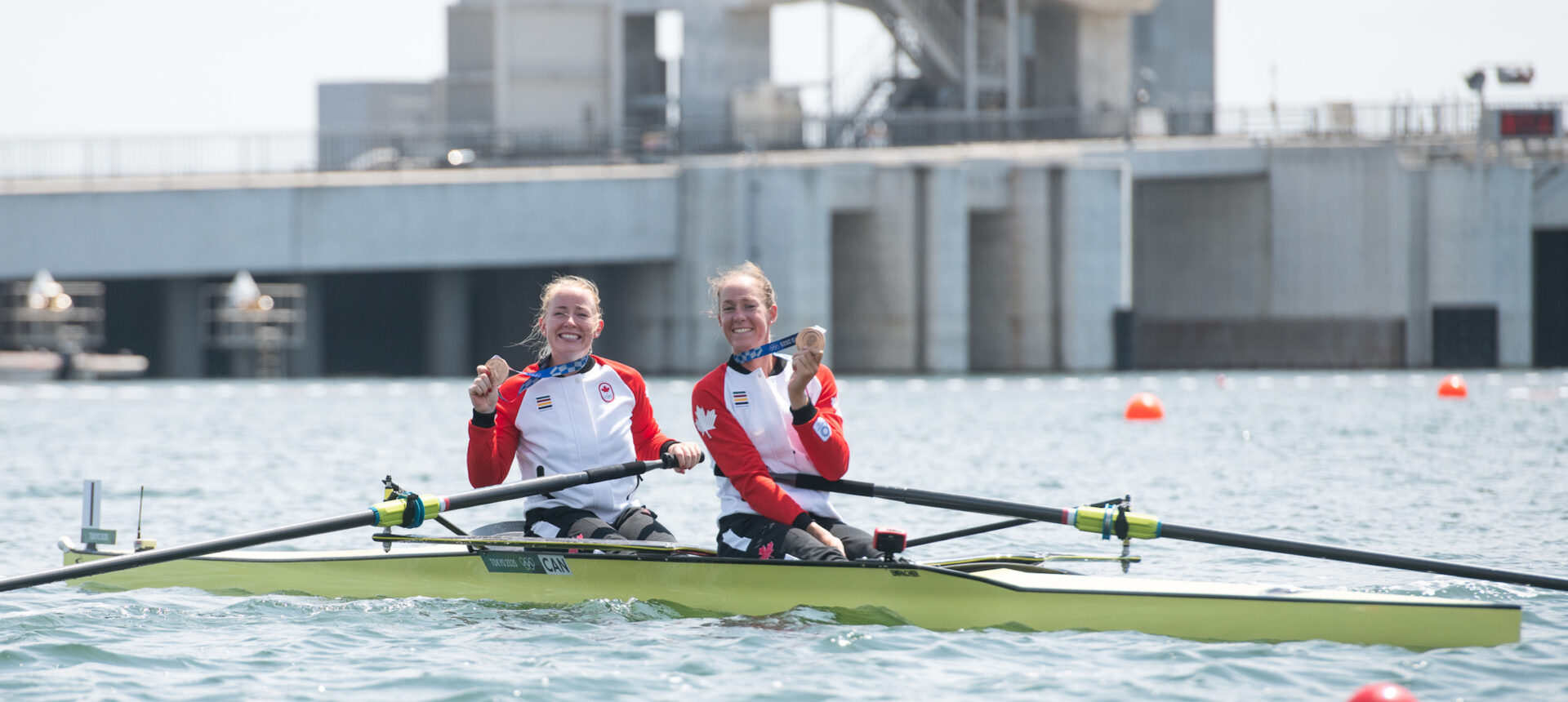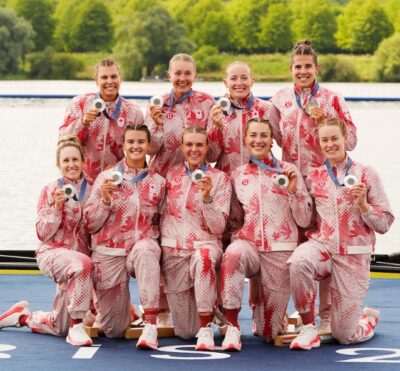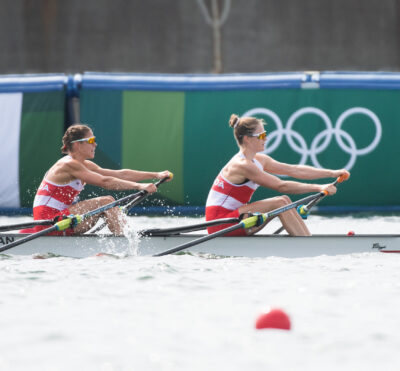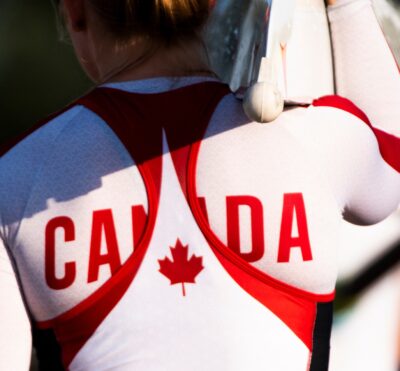
Caileigh Filmer tackles mental health challenges to win Olympic bronze
- Featured
- Jul 29, 2021
“At 100 days to go before the Tokyo Olympic Games, I was going through a bad depression patch, and on the edge of stepping away from high performance rowing.”
As they crossed the finish line in their final race down the Sea Forest Waterway course, realizing that they had won a bronze medal, Caileigh Filmer reached forward to hug Hillary Janssens.
Caileigh finished third in the women’s pair event in Tokyo with Hillary after a long and very difficult journey to get to the Games.
On her Instagram feed, she shares a very personal account of how she was spiralling downwards with her mental health and how with only 100 days to go before Tokyo, she was in such a bad place she was ready to quit. She was sharing excerpts from the private journal she wrote to try to help her get out of that dark place.
View this post on Instagram
Caileigh won the 2018 World Championships with her partner Hillary Janssens and was getting set for her second Olympics, where she was expected to be a medal favourite. But she writes she was terrified about going. Her worst moments came thinking about sitting on the start line at the Olympics and praying for it to be over. She was frightened she’d be in a worse place and more depressed than ever when the Games were over.
In an interview with Rowing Canada Aviron from her room in the Olympic Village conducted just before the competition began, Caileigh was smiling thinking about how she made it to Japan and how she is much healthier these days. She says a few months ago, she never expected to be here.
“I was sad about being sad. I was really upset that I wasn’t excited (to go to the Olympics)”.
She found it shocking that despite the fact she was used to doing 30 hours of training a week, she was hurting so much inside that she felt she didn’t have the strength to get through a seven-minute race in Tokyo.
She adds, “I didn’t want to put myself under the microscope. You’re on television, and everyone is watching you. To me, that was the most terrifying thought to be sitting at the start line and be like, I don’t want to be here.”
In her Instagram post, she writes about how supportive everyone was around her including her coach and teammates who wanted her to put her health first. She was all set to walk away until Karl Hale, a friend of hers from outside the sport who had nothing to gain, told her she shouldn’t quit and gave her a reason to keep going.
She explains the turning point in more detail to Rowing Canada Aviron. “What really saved my Olympic dream is Karl reminded me of the power I had. He said, you’re someone who has been so open with your mental health, why not use your mental health, and how inspiring you are to try to inspire other people by getting through this and you kicking your depression in the butt.”
“I cried as he said it because I didn’t want to hear it. But as it sunk (in), it was the first time I saw light in what felt like a dark thunderstorm.”
She writes in her journal about how much Karl’s words resonated with her and allowed her to turn the corner. She took a couple of weeks off and eventually found the support she needed.
It wasn’t the first time, unfortunately, that Caileigh struggled with mental health challenges. In university, she had dealt with anxiety. But things really came to a head after she won the World Championships in 2018.
At that time, it was hard for people to know she was not well. Everybody thought she was on the top of the world. She wasn’t in the habit of opening up when she was having a bad day. She liked taking care of others but didn’t see she wasn’t taking care of herself.
“I’m generally a pretty happy person on our team and pretty bubbly. I didn’t realize how much I was using that to mask how I was feeling.”
Soon it became too difficult for her to mask any longer.
The pressure of trying to repeat as world champion took a toll. She found herself criticizing everything she did. She battled illnesses and injuries. Her mom was dealing with cancer at the time. It all became quite toxic.
“I couldn’t stop crying. I couldn’t get myself out of bed in the morning. I loved spending time with friends and teammates, but nothing was helping. Rowing was normally my escape. Once I would get to the boathouse, I’d be happy. But it was no longer an escape. Every stroke was now difficult. Something was seriously wrong.”
She went to her coaches and told them she was not well. Then she saw team doctors Mike Wilkinson and Cara Ewert. Ewert diagnosed her with clinical depression.
“I was unaware of my depression that had been lingering, and when that fully took me out of the boat, there wasn’t a future in sight anymore.”
After the diagnosis, Caileigh asked her coaches not to hide anything from the team. They used it as an example, telling the rowers that everyone is going to have battles in their career whether it’s mental health or physical injury, and that the athletes need to know there is support available for them.
Caileigh says it was no longer about performing in sports but simply getting through day-to-day things. She says her twin sister and her parents were there for her every step of the way.
“I had a day where my family literally burst out in tears because they heard me laugh for the first time in a while. They were like, ‘we have the old Caileigh back’.”
She was off the water for three months as she recuperated. In July of 2019, she was finally able to get back in the boat with her partner Hillary. They only had six weeks to prepare for the World Championships. Impressively, they won a bronze medal and helped the women’s eight qualify for the Tokyo Olympics, finishing fourth.
Caileigh learned valuable lessons through that experience. There are going to be ups and downs, you are not weak asking for help, and when things get really bad, you need to step away.
“I’ve just made it so that I’m comfortable saying, ‘hey, you know what, I’m really not doing well’. I’ve taken two weeks here and there for my depression. ‘I’m just like, you know, I’m mentally not healthy enough to be at the boathouse’. It’s the same as if you have a rib injury, and you’re out for a few weeks.”
She says she is lucky to have a great support team around her. Knowing that Tokyo might bring on added pressure and fuel her depression, her counsellor, Ryan Leiderman, advised her to keep a journal and to find gratitude in her day. She wrote down the ten things that she was most grateful for coming into Tokyo, which includes her partner Hillary and her family.
Other gratitude moments included her days on Elk Lake in Victoria and the time spent with her rowing family, her growing pains on the development team, and the lessons learned competing as a 19-year-old at the Rio 2016 Olympics.
“Having this gratitude journal, if I started feeling really upset, sad or down and not confident in myself, I could just pick up the journal and read it.”
View this post on Instagram
(Gratitude no. 8, 9 days to Tokyo) “I wanted to dedicate this entry to everyone who has struggled with mental health along their journeys to whatever their goals have been in life.”
Caileigh says some might wonder why she has decided to take something so private and share it on Instagram. She says it’s important to share the good and the bad moments.
“I decided it would be pretty cool to share this journal that I’m writing for myself for everyone who follows me. I know some people might be like, you’re just talking about yourself, but if anyone thinks that way, they probably don’t have any understanding of mental health.”
Caileigh finds the posts therapeutic.
“At the Olympics, people want to know about your journey. During the Games, they only care about your actual racing and did you get a medal or not. And so, right now, I just have such a privilege. I’m in this position that people are looking at me. What a cool opportunity to share this journal and to have it make a difference.”
So far, she has had quite the response. Many have told her she’s brave and her posts are helping them.
“People I know from other countries have been coming up to me saying, they really have enjoyed reading the gratitude journal. When I was struggling with 100 days out, what flipped the switch was to be an inspiration kicking this depression in the butt. Hearing how people have been inspired by my journey, that’s really helping me.”
Leading up to Tokyo, Caileigh’s partner, Hillary, assisted by regularly checking in and asking her important questions like, ‘how are you doing today?’
“I’m lucky enough that I’m in a good mental place right now. I feel healthy. I feel lucky to race with Hillary.”
They reached their goal of winning an Olympic medal. But the long-lasting impact Caileigh hopes to have from the Games in Tokyo goes well beyond something she can wear around her neck from time to time. She’d like nothing more than to have her story fuel more conversation around mental health.
View this post on Instagram
Tokyo countdown = 0, Sleeps until we race = 1
“I want to share how much gratitude I have for all the support I have had from everyone who has been following my journals. The responses I’ve received have been overwhelming. I feel so lucky to be able to have had the chance and ability to share some of my stories and to have been able to help others, and in turn also get to hear and learn from other’s experiences.”
More information on the Tokyo 2020 regatta and the 10 Canadian crews competing can be found here.
Story by Teddy Katz


